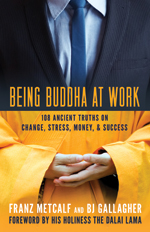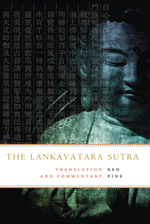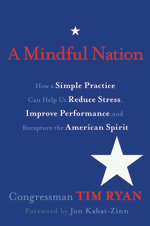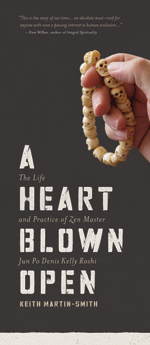 Back in 1999, Buddhist scholar Franz Metcalf took the concept “What Would Jesus Do?” popular with Christian evangelicals and spun it into What Would Buddha Do?, a book of Buddhist wisdom for everyday life. Now, he and sociologist BJ Gallagher follow this up with Being Buddha at Work: 108 Ancient Truths on Change, Stress, Money & Success (Berrett-Koehler, 2012, $14.95, paper, 176 pp.), this time applying ancient Buddhist wisdom to the modern workplace (see “Brief Teachings,” page 16). Organized around 108 questions with short and sweet responses, the book suggests what the Buddha would do in circumstances ranging from how to handle an overabundance of email to handling an adulterous affair at work. (Hint: the Buddha says don’t even start one.) But make no mistake: although the book was written with both neophytes and advanced practitioners in mind, it’s not Buddhism lite; every answer is based on traditional texts or teachings, many from the Pali canon. And it’s not feel-good fluff, either. For instance, in the section “How Do Mindful People Deal with Jerks?” the authors write, “You want to know the reason why everyone is treating you so badly? It’s because you started it long before…. It was your own hostility, your own duplicity, that began the cycle that led to your current situation. (We know … this isn’t the answer you wanted to hear.)” Clearly, sugarcoating is not something the Buddha would do.
Back in 1999, Buddhist scholar Franz Metcalf took the concept “What Would Jesus Do?” popular with Christian evangelicals and spun it into What Would Buddha Do?, a book of Buddhist wisdom for everyday life. Now, he and sociologist BJ Gallagher follow this up with Being Buddha at Work: 108 Ancient Truths on Change, Stress, Money & Success (Berrett-Koehler, 2012, $14.95, paper, 176 pp.), this time applying ancient Buddhist wisdom to the modern workplace (see “Brief Teachings,” page 16). Organized around 108 questions with short and sweet responses, the book suggests what the Buddha would do in circumstances ranging from how to handle an overabundance of email to handling an adulterous affair at work. (Hint: the Buddha says don’t even start one.) But make no mistake: although the book was written with both neophytes and advanced practitioners in mind, it’s not Buddhism lite; every answer is based on traditional texts or teachings, many from the Pali canon. And it’s not feel-good fluff, either. For instance, in the section “How Do Mindful People Deal with Jerks?” the authors write, “You want to know the reason why everyone is treating you so badly? It’s because you started it long before…. It was your own hostility, your own duplicity, that began the cycle that led to your current situation. (We know … this isn’t the answer you wanted to hear.)” Clearly, sugarcoating is not something the Buddha would do.
 With the recent publication of The Lankavatara Sutra: Translation and Commentary (Counterpoint, 2012, $30, cloth, 320 pp.), Bill Porter, writing as Red Pine, continues his project of translating Buddhist texts from Chinese into English. (His previous works include translations of the Heart Sutra, theDiamond Sutra, and the Platform Sutra.) The Lankavatara Sutra is an important Zen text; Bodhidharma, Zen’s first Patriarch, is believed to have given his copy of it to his successor, Hui-k’o, telling him that it contained everything he needed to know. What are the essentials? First, that everything we perceive as being real is nothing but the product of our own minds, and second, knowledge is something we must realize for ourselves—it cannot be explained in words. “Everything is like horns on a rabbit or a horse,” the Buddha tells the bodhisattva Mahamati, “the mistaken projections of an imagined reality by ignorant beings.” Translations are accompanied by Red Pine’s explanatory notes; his easygoing tone makes a difficult text accessible.
With the recent publication of The Lankavatara Sutra: Translation and Commentary (Counterpoint, 2012, $30, cloth, 320 pp.), Bill Porter, writing as Red Pine, continues his project of translating Buddhist texts from Chinese into English. (His previous works include translations of the Heart Sutra, theDiamond Sutra, and the Platform Sutra.) The Lankavatara Sutra is an important Zen text; Bodhidharma, Zen’s first Patriarch, is believed to have given his copy of it to his successor, Hui-k’o, telling him that it contained everything he needed to know. What are the essentials? First, that everything we perceive as being real is nothing but the product of our own minds, and second, knowledge is something we must realize for ourselves—it cannot be explained in words. “Everything is like horns on a rabbit or a horse,” the Buddha tells the bodhisattva Mahamati, “the mistaken projections of an imagined reality by ignorant beings.” Translations are accompanied by Red Pine’s explanatory notes; his easygoing tone makes a difficult text accessible.
 The title of Ohio Congressman Tim Ryan’s new book A Mindful Nation: How a Simple Practice Can Help Us Reduce Stress, Improve Performance, and Recapture the American Spirit (Hay House, 2012, $19.95, paper, 240 pp.) promises a lot for mindfulness. It thus comes as no surprise that Ryan, who has been an advocate of the practice for years, writes from a place of boundless optimism: “I do think we can find the kind of new economy we need to keep people meaningfully employed, learn to live in better harmony with the earth, and be wiser in our use of resources and energy.” Mindfulness, he says, should be a large piece in this puzzle, not as “the magic potion that gets us all that” but as a “critical element in helping us along the way.” If there’s one thing that A Mindful Nation illustrates, it’s just how many Americans mindfulness has helped along the way. The practice is now used everywhere from major corporations to the military (where it goes by the more rough-and-tumble name of Mindfulness-based Mind Fitness Training). Even for readers already familiar with mindfulness practice, the personal stories included in A Mindful Nation are inspiring. Near the end Ryan writes, “We need to raise our children in a nation that teaches them to be mindful, that teaches them about the importance of kindness and being connected to their fellow human beings…. A nation that teaches them to appreciate their basic human goodness and see that goodness in others.” You can practically hear the crowds cheering him on.
The title of Ohio Congressman Tim Ryan’s new book A Mindful Nation: How a Simple Practice Can Help Us Reduce Stress, Improve Performance, and Recapture the American Spirit (Hay House, 2012, $19.95, paper, 240 pp.) promises a lot for mindfulness. It thus comes as no surprise that Ryan, who has been an advocate of the practice for years, writes from a place of boundless optimism: “I do think we can find the kind of new economy we need to keep people meaningfully employed, learn to live in better harmony with the earth, and be wiser in our use of resources and energy.” Mindfulness, he says, should be a large piece in this puzzle, not as “the magic potion that gets us all that” but as a “critical element in helping us along the way.” If there’s one thing that A Mindful Nation illustrates, it’s just how many Americans mindfulness has helped along the way. The practice is now used everywhere from major corporations to the military (where it goes by the more rough-and-tumble name of Mindfulness-based Mind Fitness Training). Even for readers already familiar with mindfulness practice, the personal stories included in A Mindful Nation are inspiring. Near the end Ryan writes, “We need to raise our children in a nation that teaches them to be mindful, that teaches them about the importance of kindness and being connected to their fellow human beings…. A nation that teaches them to appreciate their basic human goodness and see that goodness in others.” You can practically hear the crowds cheering him on.
 A Heart Blown Open: The Life & Practice of Zen Master Jun Po Denis Kelly Roshi (Divine Arts, 2012, $22.95, paper, 300 pp.) by Keith Martin-Smith is a biography of the abbot of the Hollow Bones Zen Center and developer of Mondo Zen, an Integral Zen hybrid that uses a customized koan system to break through psychological barriers to awakening. The story takes us from Kelly’s earliest childhood, experienced in the shadow of an abusive, alcoholic father, all the way up to the present, following his successful battle with stage-IV throat cancer and a fresh start as head of a lay Zen order. Kelly’s path is a colorful one, lived fully in the spirit of his times and the sixties counterculture. He dodges the draft for a time but ends up serving a brief spell in the army, though managing to avoid Vietnam (he received a “general honorable unsuitable discharge 635-201”), then moves into dealing drugs and manufacturing LSD in San Francisco. When his drug venture falls apart, Kelly lives as a fugitive, studying with Chögyam Trungpa Rinpoche, Shunryu Suzuki Roshi, and Eido Shimano Roshi, who later gives him dharma transmission. Eventually, Kelly’s past catches up with him, and he is sent to federal prison for two years. (Prison, Eido Roshi tells him, will be a good place to practice.) Throughout the book, the author pays particular attention to details of personal appearance, clothing, and the like. Although helpful in immersing us in the scene, they appear so often it becomes distracting. Martin-Smith is Kelly’s student, and at times he seems a bit too much in awe of his subject. But Kelly’s life is never without incident, and what emerges is an entertaining picture of a self-described narcissist battling his demons and having a pretty good time doing it.
A Heart Blown Open: The Life & Practice of Zen Master Jun Po Denis Kelly Roshi (Divine Arts, 2012, $22.95, paper, 300 pp.) by Keith Martin-Smith is a biography of the abbot of the Hollow Bones Zen Center and developer of Mondo Zen, an Integral Zen hybrid that uses a customized koan system to break through psychological barriers to awakening. The story takes us from Kelly’s earliest childhood, experienced in the shadow of an abusive, alcoholic father, all the way up to the present, following his successful battle with stage-IV throat cancer and a fresh start as head of a lay Zen order. Kelly’s path is a colorful one, lived fully in the spirit of his times and the sixties counterculture. He dodges the draft for a time but ends up serving a brief spell in the army, though managing to avoid Vietnam (he received a “general honorable unsuitable discharge 635-201”), then moves into dealing drugs and manufacturing LSD in San Francisco. When his drug venture falls apart, Kelly lives as a fugitive, studying with Chögyam Trungpa Rinpoche, Shunryu Suzuki Roshi, and Eido Shimano Roshi, who later gives him dharma transmission. Eventually, Kelly’s past catches up with him, and he is sent to federal prison for two years. (Prison, Eido Roshi tells him, will be a good place to practice.) Throughout the book, the author pays particular attention to details of personal appearance, clothing, and the like. Although helpful in immersing us in the scene, they appear so often it becomes distracting. Martin-Smith is Kelly’s student, and at times he seems a bit too much in awe of his subject. But Kelly’s life is never without incident, and what emerges is an entertaining picture of a self-described narcissist battling his demons and having a pretty good time doing it.
Thank you for subscribing to Tricycle! As a nonprofit, we depend on readers like you to keep Buddhist teachings and practices widely available.